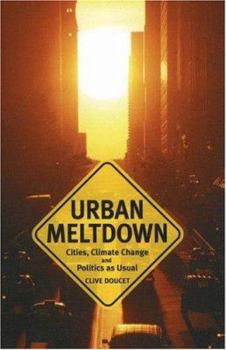Urban Meltdown: Cities, Climate Change and Politics as Usual
In 1950, only 30 percent of the world's population lived in cities. By 2007, the planet's population has doubled, and today, as many people live in cities as populated the entire planet in 1950.... This description may be from another edition of this product.
Format:Paperback
Language:English
ISBN:086571584X
ISBN13:9780865715844
Release Date:May 2007
Publisher:New Society Publishers
Length:251 Pages
Weight:0.95 lbs.
Dimensions:0.7" x 6.2" x 9.0"
Customer Reviews
3 ratings
Very insightful
Published by Thriftbooks.com User , 16 years ago
I like this book because its author, Clive Doucet, tells about the conditions that can cause cities and societies to fail, and also about what cities and societies need to do in order to be successful and stay successful. I really like all books that tell us about solutions to problems and/or better alternatives to the status quo. In this book, I was also interested in what Mr. Doucet said about how North America's aboriginal socieites have traditionally differed from European ones. According to Mr. Doucet, North America's aboriginal societies have traditionally been cooperative ones, while European societies have traditionally been competitive ones, and that North Americans from European backgrounds need to make our society become cooperative like the traditional ones of North America's aboriginal people in order to save the planet. I am not from an aboriginal background myself (I am from Welsh and Scottish backgrounds), but I agree with Mr. Doucet that those of us who are from European backgrounds have something to learn from traditional aboriginal societies.
Traffic sewers, carnivorous capitalism and political poetry
Published by Thriftbooks.com User , 16 years ago
How many times have we all heard it? "You can't fight City Hall!" That little aphorism derives from a time when City officials were often bribed. "Buying" urban politicians seemed a commonplace. City politicians aren't often "on the take" these days, but rigidity of their thinking keeps City Hall at a remote, yet still powerful, distance. Now we're coping with a mind-set, something that doesn't come under the attention of a prosecutor. For Clive Doucet, a Canadian poet, fighting City Hall isn't the answer. What we need is to either change the outlook, or else change the people occupying City Hall. In this stimulating and invigorating book, he sets out how the mind-set came to be, what it promises for our future and why we need to change it. The cities we live in today, he notes, are drastically different from those of even our recent past. Once cities were places of close interaction - houses, shops, markets, and local governance. In old empires, such as Rome, cities didn't adapt to changing environments. Yet, there was the appeal of the city that brought those who wished to enjoy their benefits. Pressures led to conflict and fixed thinking in the cities led to their demise - although new ones arose in other places. Today, our cities are extended masses of humanity, linked tenuously by that amazing phenomenon, the automobile. Cars, and their offspring trucks, created an entirely new form of urban structure. The urban economy - including food - has come to rely on "Just-in-time" transport where products are delivered for use and inventory is minimal. This practice, plus the individual commuter and the amalgamation of small farms into "agribiz", has flooded the countryside with vehicles. Cities, as a result, contribute 80% of North America's aerial pollution. Doucet uses Toronto and Ottawa's Glebe as examples of how North American cities have been transformed. When he moved to the Glebe, it was quiet, hardly wealthy, and an intimate community. His poetic skills come to the fore in describing his life there and in what a well-run city can offer a concerned resident. How did a relatively run-down neighbourhood become transformed into an affluent community, beset by intense traffic, and suffering costly changes? He argues that the "privatization" of roads - removing quiet streetcar lines to allow increased auto traffic was the primary cause. Inner city residents fled to suburbs creating the "mall mentality", depleting the inner city of resources and making "traffic sewers" filled with automobiles. The result is that, instead of improving social services such as schools, hospitals and child-care, cities now spend 25% - 50% of their budgets in road construction or maintenance. That's your tax dollars. "The wretched thing about urban expressways", he notes, "is that they create a landscape that never heals". The demand for more pavement for automobiles even led to a serious proposal to pave Ottawa's Rideau Canal - the world's
College-level holdings strong in urban planning issues must have
Published by Thriftbooks.com User , 17 years ago
College-level holdings strong in urban planning issues must have URBAN MELTDOWN: CITIES, CLIMATE CHANGE AND POLITICS AS USUAL. It comes from a poet, city councilor and urban activist who examines how urban growth is accelerating global warming and considers why political action seems stalled. Chapters examine the economics, politics and political challenges at all levels of government in the process of considering urban environments and environmental issues alike. Diane C. Donovan California Bookwatch





